We routinely ask our staff, board members and volunteers to share their Why I LIFT stories. Doing so is a way to ground our shared work in our own personal history and motivations, and to get to the root of what drives our sense of urgency to pursue our mission of empowering families to break the cycle of poverty. It is also an acknowledgement of the fact that, every day, our parent members entrust us with deeply personal information about their backgrounds and aspirations, and as part of our commitment to equity, we must also open ourselves to the vulnerability and opportunity of sharing our stories with each other. Maggie first joined LIFT as an AmeriCorps VISTA Fellow and was promoted to Operations Associate shortly after her service year ended. This is her story.
“Why do you LIFT?” is always a multi-faceted question for me, and it changes from day to day. When I was thinking about what I wanted to say, I thought about a lot of things, like how I was fortunate to have a great support network and how I was lucky that after my parents split up, my dad paid the child support and alimony that kept my brother and me relatively comfortable while my mom got back on her feet. And that throughout myriad shaky ground moments of my own, I’ve always had a village behind me making sure everything was okay. I was lucky I had access to a great education, and people to fall back on when times got tough.
I went to college in a lower-income, predominantly African American neighborhood in North Philadelphia, where the university frequently clashed with long-time residents and we were told during a session on safety at orientation not to talk to “strangers.” Each year, I saw more and more two-story row homes razed to make way for lavish “students only” apartment buildings. And every time I moved into a new apartment, no matter how friendly I was to my neighbors or how respectful I tried to be, I participated, however passively, in the gentrification of an already polarized community. I deeply value many parts of my college experience, and am grateful for the opportunities I had, but at the end of the day, I was part of the problem simply by attending a school that long ago turned its back on its original mission to serve the surrounding community. By the time I graduated, I had come to the uncomfortable but inescapable realization that if I am not part of the solution, I am part of the problem. I remember distinctly saying this to either Sarah or Sol during my interview process over a year ago, and I have found myself often thinking of the families in North Philly during my time here.
But right now, I LIFT because the current face of our nation is a face of the hatred, bigotry, and discrimination that has always been woven firmly into the fabric of the United States. It would have been easy for me, after November 2016, to retreat back to my safe bubble of suburban whiteness. To wash my hands of the racists in the street hurling slurs and bricks, because I’m not “one of those white people,” and to go on living largely as I had before, secure in my knowledge that at the bottom line, my life probably won’t change that drastically. And, fundamentally, to ignore the fact that half of all white women voted for that face, and that I and people like me—white people—directly benefit from the institutionalized classism and racism that we at LIFT fight so hard against.
I LIFT because the level of respect and support afforded a person shouldn’t be based on their skin color or socioeconomic status, but too often is. I LIFT because this past August, Neo-Nazis and other white supremacist terrorists marched in the streets of Charlottesville, unhindered and uninterrupted by the National Guard or police in riot gear and legitimized by a White House that refuses to speak out. And I LIFT for our members, because they matter, because no one should have to live every day feeling forced to justify their right to live, and because their children and their children’s children deserve to grow up in a world where they don’t feel like they are valued less because of the color of their skin or their zip code or the money in their wallet. I LIFT because I cannot be silent, because if I am neutral in situations of injustice I choose the side of the oppressor.
There is a poem inscribed at the UN Building by the Persian poet Sa’adi, called Bani Adam, or Children of Adam, that I want to share with you in translation. I think it sums up why I LIFT far more eloquently than I just did or ever could:
“The sons of Adam are limbs of each other,
Having been created of one essence.
When the calamity of time affects one limb
The other limbs cannot remain at rest.
If you have no sympathy for the troubles of others,
You are unworthy to be called by the name of a Human.”
